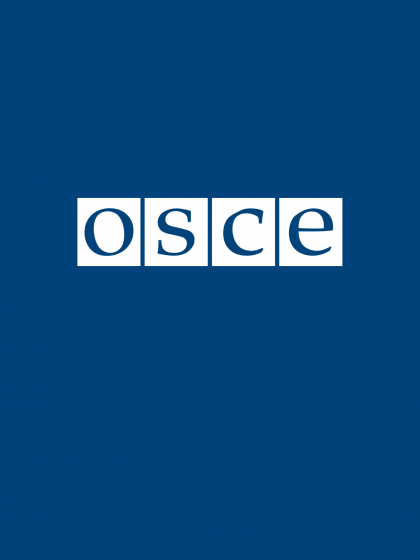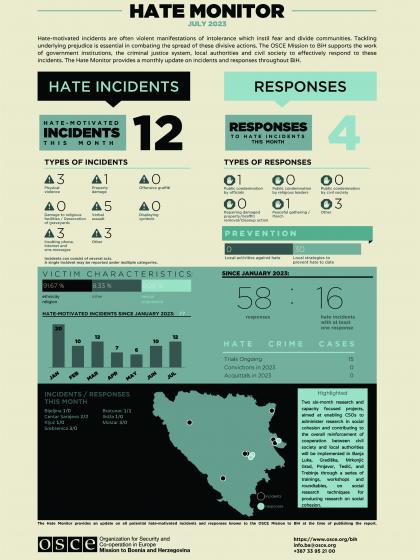Documents library
Journal of the 1455th Plenary Meeting of the Permanent Council
Publishing date: 7 December 2023
Collections: 1455th Plenary Meeting of the Permanent Council
Content type: Conference / meeting document
Where we are: Permanent Council
Publisher: Organization for Security and Co-operation in Europe
The Russian Federation’s ongoing aggression against Ukraine. Report by the High Commissioner on National Minorities, Ambassador Kairat Abdrakhmanov. Address by the Personal Representative of the OSCE Chairman-in-Office on Combating Anti-Semitism and by the Personal Representative of the OSCE Chairman-in-Office on Combating Racism, Xenophobia and Discrimination, also Focusing on Intolerance and Discrimination against Christians and Members of Other Religions. Report by the Special Representative of the OSCE Chairman-in-Office on Combating Corruption, Prof. Anita Ramasastry. Ongoing crimes by the Kiev regime and dangerous policies of the Western alliance to exacerbate tensions.
Statement by the Delegation of the United States of America in response to reports by the OSCE Chairperson’s Personal Representatives on Tolerance and Non-Discrimination
Publishing date: 7 December 2023
Collections: 1455th Plenary Meeting of the Permanent Council
Content type: Statement / speech
Where we are: Permanent Council
What we do: Tolerance and non-discrimination
Publisher: Organization for Security and Co-operation in Europe
Statement by the Delegation of Ukraine in response to reports by the OSCE Chairperson’s Personal Representatives on Tolerance and Non-Discrimination
Publishing date: 7 December 2023
Collections: 1455th Plenary Meeting of the Permanent Council
Content type: Statement / speech
Where we are: Permanent Council
What we do: Tolerance and non-discrimination
Publisher: Organization for Security and Co-operation in Europe
1455th Plenary Meeting of the Permanent Council
Statement by the Delegation of Norway in response to reports by the OSCE Chairperson’s Personal Representatives on Tolerance and Non-Discrimination
Publishing date: 7 December 2023
Collections: 1455th Plenary Meeting of the Permanent Council
Content type: Statement / speech
Where we are: Permanent Council
What we do: Tolerance and non-discrimination
Publisher: Organization for Security and Co-operation in Europe
1455th Plenary Meeting of the Permanent Council
Statement by the Delegation of the Russian Federation in response to reports by the OSCE Chairperson’s Personal Representatives on Tolerance and Non-Discrimination
Publishing date: 7 December 2023
Collections: 1455th Plenary Meeting of the Permanent Council
Content type: Statement / speech
Where we are: Permanent Council
What we do: Tolerance and non-discrimination
Publisher: Organization for Security and Co-operation in Europe
Statement by the Spanish EU Presidency in response to reports by the OSCE Chairperson’s Personal Representatives on Tolerance and Non-Discrimination
Publishing date: 7 December 2023
Collections: 1455th Plenary Meeting of the Permanent Council
Content type: Statement / speech
Where we are: Permanent Council
What we do: Tolerance and non-discrimination
Publisher: Organization for Security and Co-operation in Europe
Hate Monitor Report, October 2023
Publishing date: 27 November 2023
Content type: Report
Where we are: OSCE Mission to Bosnia and Herzegovina
What we do: Human rights, Rule of law, Tolerance and non-discrimination
Publisher: Organization for Security and Co-operation in Europe
It is important to know what a hate crime is. When a hate crime is committed, one or more perpetrators target the victim, which can be one or more people or property, because of a protected aspect of the victim's identity, such as religion or ethnicity, race, sexual orientation or disability. Similarly, a hate incident is an act of hostility motivated by prejudice or bias that does not necessarily reach the threshold of a criminal offence, or the criminal nature of which is yet to be determined. A hate crime is any crime where the perpetrator is driven by prejudice or bias. Criminal offence + bias motive = hate crime.
Hate Monitor Report, September 2023
Publishing date: 27 October 2023
Content type: Report
Where we are: OSCE Mission to Bosnia and Herzegovina
What we do: Human rights, Rule of law, Tolerance and non-discrimination
Publisher: Organization for Security and Co-operation in Europe
It is important to know what is a hate crime. When a hate crime is committed, one or more perpetrators target the victim, which can be one or more people or property, because of a protected aspect of the victim's identity, such as religion or ethnicity, race, sexual orientation or disability. Similarly, a hate incident is an act of hostility motivated by prejudice or bias that does not necessarily reach the threshold of a criminal offence, or the criminal nature of which is yet to be determined. A hate crime is any crime where the perpetrator is driven by prejudice or bias. Criminal offence + bias motive = hate crime.
Hate Monitor Report, August 2023
Publishing date: 20 September 2023
Content type: Report
Where we are: OSCE Mission to Bosnia and Herzegovina
What we do: Human rights, Rule of law, Tolerance and non-discrimination
Publisher: Organization for Security and Co-operation in Europe
Hate-motivated incidents are often violent manifestations of intolerance, which instill fear and divide communities. Tackling underlying prejudice is essential in combating the spread of these divisive actions. The OSCE Mission to Bosnia and Herzegovina supports the work of government institutions, the criminal justice system, local authorities and civil society to effectively respond to these incidents. The 'Hate Monitor' provides a monthly update on incidents and responses throughout Bosnia and Herzegovina.
Hate Monitor Report, July 2023
Publishing date: 31 August 2023
Content type: Report
Where we are: OSCE Mission to Bosnia and Herzegovina
What we do: Human rights, Rule of law, Tolerance and non-discrimination
Publisher: Organization for Security and Co-operation in Europe
It is important to know what a hate crime is. When a hate crime is committed, one or more perpetrators target the victim, which can be one or more people or property, because of a protected aspect of the victim's identity, such as religion or ethnicity, race, sexual orientation or disability. Similarly, a hate incident is an act of hostility motivated by prejudice or bias that does not necessarily reach the threshold of a criminal offence, or the criminal nature of which is yet to be determined. A hate crime is any crime where the perpetrator is driven by prejudice or bias. Criminal offence + bias motive = hate crime.





